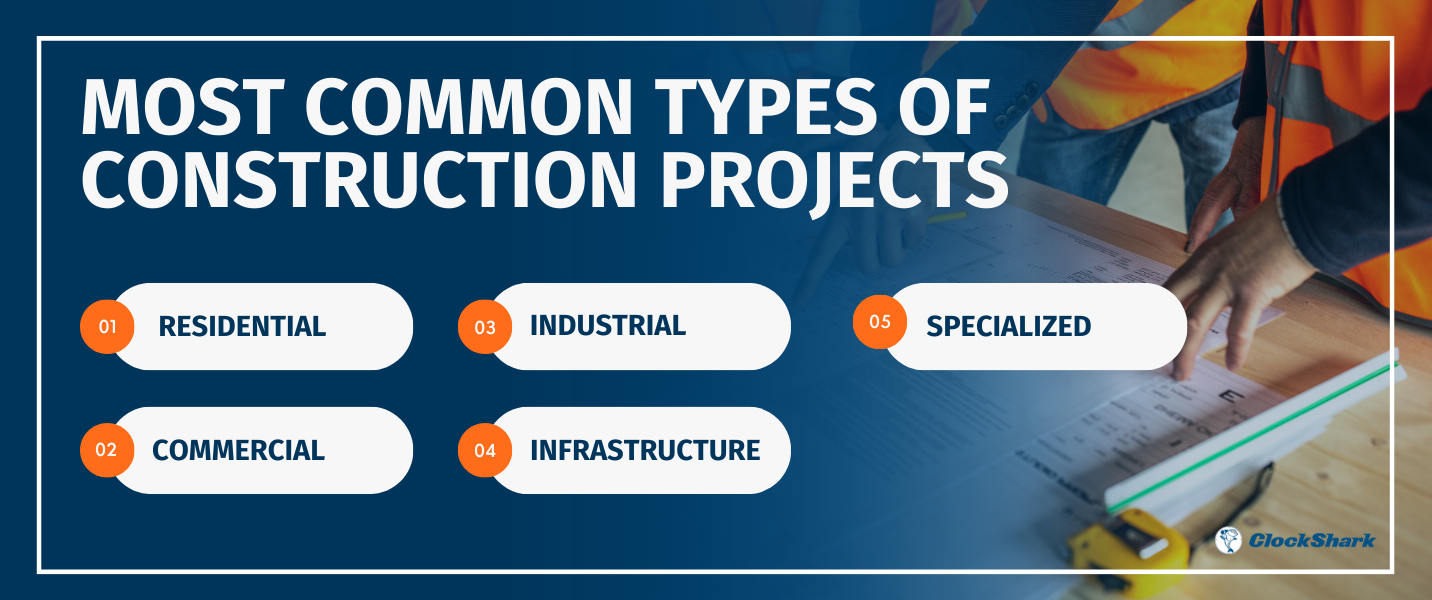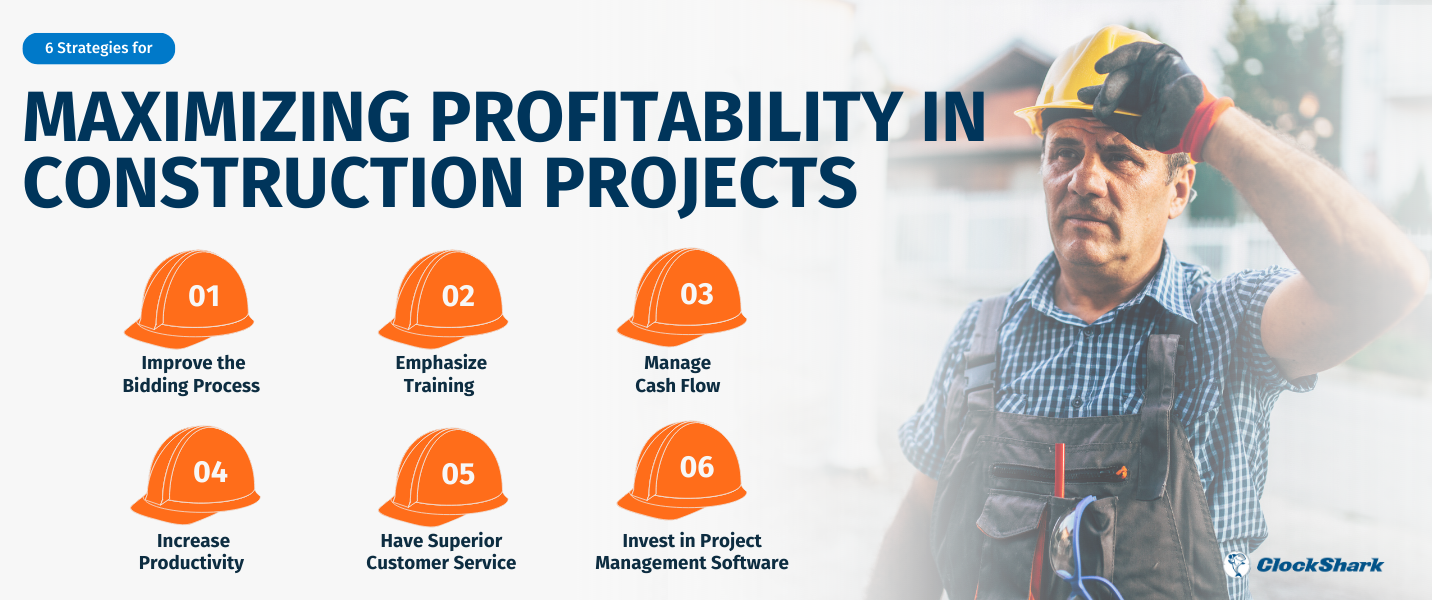The construction industry is diverse and encompasses a wide range of projects, each with its own unique characteristics and challenges. Understanding the unique characteristics and requirements of each project type is crucial to implementing strategies that will drive your success.
When you're a small contractor, the ability to maximize profitability is crucial for growth and sustainability. It requires strategic planning, efficient operations, and proactive decision-making.
In this article, we will discuss the types of construction projects and explore key strategies that construction professionals can employ to enhance their profitability and ensure long-term success.
Breaking Down the Types of Construction Projects
A construction company’s profitability often depends on how well its projects are managed. Some projects are so large a few percent can mean the difference in red or black ink. If materials and labor are managed poorly those few percent can be hard to find.
Residential Construction Projects
Residential construction projects are often a delicate balance of good project management, material management, and forecasting. Residential construction projects include both single and multi-family dwellings, although each requires adherence to different building standards.
In contrast to commercial building projects, residential projects tend to ebb and flow with mortgage interest rates. Residential construction projects tend to have a strong effect on material prices and availability because of the volatile nature of housing demand.
Material management can be a profit center for those residential builders that stay informed of every stage of every project at all times. When the availability of materials and labor is ever-changing, having the most up-to-date information at your fingertips is a huge advantage.
Commercial Construction Projects
Commercial projects may benefit the most from the minor adjustments that effective project management provides. Commercial construction projects can be complex to manage because they often represent significant construction risks, compared to residential, single-family housing.
Modern technology can reduce the efforts of those in the back office, as well as those in the field. Commercial projects are typically subject to more stringent building codes, like ADA compliance, approvals from local municipalities, and use restrictions such as zoning.
Like residential construction projects, commercial projects tend to evolve over the life of the project. Anticipating changes is much easier when the project parameters are organized and categorized, helping the project manager identify issues while they are still small.
Industrial Construction Projects
Industrial construction projects are often tightly coordinated to avoid downtime and production losses. Even the smallest hiccup in the logistics, weather, and location of an industrial construction project can cause a ripple effect.
Industrial construction projects can take many months to complete, so the availability of labor and materials can shift from the start of a project until completion. Industrial construction projects must often be timed around production schedules to minimize downtime.
Industrial construction work success is often found in meeting deadlines and producing quality results. Fortunately, industrial construction work is less dependent on interest rates, so industrial projects are more consistently available.

Infrastructure Construction Projects
Infrastructure construction projects are often tied to budgets allocated years in advance. Sometimes, unpredictable events, like the pandemic, can toss a wrench into the most well-laid plans.
As we know, information is power. The more information a contractor can manage quickly, like material forecasting and price fluctuations, the better. Infrastructure building can place large demands on local material vendors, like concrete and steel manufacturers.
As such, infrastructure construction projects require enormous planning. Using job management software greatly reduces the workload of project managers by organizing job info in a way that is easy to access and digest.
When logistics problems present a delay, project management software can provide reporting that helps reroute labor, machinery, and tools in advance. Using software also keeps the project data centrally located, allowing project managers, principals, and crews to share the information.
Specialized Construction Projects
Specialized construction projects tend to serve a profitable niche. However, the market is often smaller, so missed opportunities affect the bottom line harder. Profitability within specialized construction projects is often tied to attention to detail and managing difficult-to-find materials.
Training plays a part in performing profitable specialized construction projects. Those contractors that offer quality-minded services to a niche market tend to rise to the top of profitability, as price takes a backseat to quality workmanship.
What Are the Main Factors Affecting Construction Profitability?
In today's competitive landscape, it is crucial for construction companies to understand the diverse factors that significantly influence the profitability of construction projects.
Low Productivity
Construction companies often live and die by productivity. When the right crews are in the right place at the right time, profitability is often automatic.
The most profitable construction professionals tend to leave the tedious work to technology, while they focus on the big picture. The results tend to add profitability to projects in the form of greater efficiency because waste is reduced by better planning.
Inaccurate Bidding
Inaccurate bids can invite all sorts of unknowns into a well-planned project. Accuracy in bidding prevents the expensive surprises that seem to happen at the worst time. However, reducing mistakes and inaccuracies not only helps avoid cost overruns but speeds up the project as well.
Poor Project Management
Poor project management is often the result of overworked professionals trying to do too much in too short a time. Even small inaccuracies can accumulate and eat away at the bottom line.
The good news is that most inaccuracies can be avoided by using construction management tools that don’t need a vacation or overtime. By allowing software to assist in mundane tasks, project managers can spend their valuable time and expertise on more important tasks.
Delayed Payments
Payment delays can bring a construction project to a grinding halt. Pre-construction estimating and take-offs should always include the payment details of a project. Draws and other progress payments should be clearly aligned with progress stages or time periods as they are completed.
Draws can be held up over small details, so project managers should keep a finger on the pulse of accounts receivable at all times. Having up-to-date progress reports, material inventories, and labor are key to preventing easily avoidable payment delays.
6 Strategies for Maximizing Profitability in Construction Projects
Managing construction project profitability is often a matter of accuracy, training, cash flow, productivity, financial investment, and excellent customer service. Here are six strategies to consider when the goal is to maximize profitability in construction projects:
1. Improve the Bidding Process
Inaccurate bidding can negate the efforts spent on training and logistics very quickly. Profitable construction companies treat bids like a business card that reflects the company’s attention to detail.
A project’s profitability must be based on the most accurate information available. Profitable construction companies often rely on the best technology available to reduce the workload on the back office while improving the quality of the bids going out.
2. Emphasize Training
There’s a very good reason why the best-trained labor is the most profitable. Well-trained labor makes fewer mistakes and produces results faster than those without training. The more specialized the training required, the less competition the construction company will have.
As a result, well-trained labor is usually more profitable because many potential customers are willing to pay for quality.
3. Manage Cash Flow
Perhaps the most profitable task a construction company can undertake is to manage cash flow in a profitable way. Construction contractors are usually paid using a draw system, where funds are disbursed to the contractor at regular stages of the project.
Avoiding late draws and progress payments often revolves around clear communication and clearly defined project stage completion. Late payments are often tied to incomplete punch lists, which are easily avoided.
The most effective project managers never let avoidable roadblocks slow down cash flow. They understand the project better than the client, so these pros never let incomplete information, inaccuracies, or other avoidable issues deter getting paid.

4. Increase Productivity
Construction companies tend to equate an increase in productivity to extra profits. Although this idea is usually true, sometimes robbing Peter to pay Paul has the opposite effect.
Profitable construction companies don’t just focus on more work. Instead, they focus on the most profitable work and become laser focused. This profit strategy relies on efficiency and accuracy, which are best achieved with tools like construction project management software.
5. Have Superior Customer Service
The most profitable construction companies understand that quality customer service is the key to profitability. Customers can be anxious when money changes hands, and these contractors do everything in their power to make the customer at ease.
Profitable construction projects often begin with a referral from a happy client, which costs the contractor nothing. Automatically, the contractor has padded the bottom line because they saved the marketing expense normally paid to attain a new customer.
6. Invest in Project Management Software
Although contractors work with tools every day, some are apprehensive when using technology. As we know, the key to embracing a new tool is using it.
Project management software is designed to help manage the day-to-day struggle, freeing up back-office personnel for more critical tasks. For example, you can:
Keep track of progress at each stage of every job
Keep everyone on the team informed about the progress of each job
Create a central hub to record all the details about a job, helping avoid missed details and lost documents
ClockShark Has the Project Management Solution You Need
Maximizing profitability in construction projects involves understanding the different types of construction projects, investing in job management software, and implementing effective cost-control measures.
ClockShark’s Job Management feature allows users to communicate, share documents, and create schedules on the fly. Users can create a job project where all of the information relevant to the project will be stored. Permissions can be assigned per user to establish control over information flow while keeping access to the information accessible to those who need it. Every job detail, like which stage the project is in, the location, and a job completion list is kept secure, safe, and backed up.
ClockShark job management software can pay for itself many times over by avoiding expensive mistakes that can wreck a project’s profitability. ClockShark helps reduce errors, increase efficiency, and save time.





